Use up and down arrows to select available result. Press enter to go to selected search result. Touch devices users can use touch and swipe gestures.
We sell, repair, calibrate & rent scales

Central Carolina Scale offers a full lineup of wheelchair scales from single ramp to dual ramp with chair. Each model is designed and built to weigh accurately, safely and dependably. You might be wondering, how accurate are wheelchair scales? The answer is they are very accurate. Easily weigh patients with mobility or safety concerns using one of our larger platform wheelchair models, designed with on/off ramps for effortless use. We offer all the top brands like Seca, Doran Medical, HealthOMeter, and Rice Lake Health Solutions. For you or your loved ones, purchasing scales from CCS is very simple. Just fill out our Request a Quote form or call us (919) 776-7737. Tell us what features you need in a wheelchair scale, & we can recommend the correct scale for your application and get you a price quote very quickly.
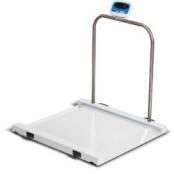
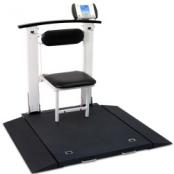
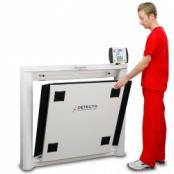
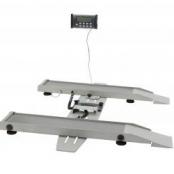
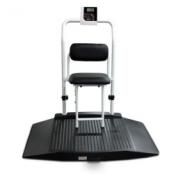
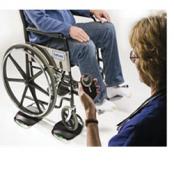



350-10-3M is a dual ramp, metal wheelchair scale joining the 350-10 Series family. This durable scale offers accurate, high-capacity weighing for a wide range of patients. The 350-10-3M has a large, stable scale base with a non-slip surface to ensure safety during patient weighing. Easy to set up, this foldable scale can be quickly moved on two heavy-duty rear wheels for efficient patient weighing in different locations.
350-10-2 & 350-10-3 single-ramp wheelchair scale with handrail allows high capacity, accurate weighing for a wide range of patients. Convenient keypad tare reduces errors and increases efficiency. Foldable and light, this sturdy scale is easily transported on two heavy-duty rear wheels to any location.
350-10-4 dual-ramp wheelchair scale with seat and handrail allows high capacity, accurate weighing for patients requiring a seat. The padded seat easily tucks away, allowing this model to function as either a wheelchair or chair scale. Convenient keypad tare reduces errors and increases efficiency. Foldable and light, this sturdy scale is easily transported on two heavy-duty rear wheels to any location.
350-10-7 single-ramp wheelchair platform scale and 350-10-8 dual-ramp wheelchair platform scale, allows high capacity, accurate weighing for a wide range of patients. Convenient keypad tare reduces errors and increases efficiency. This sturdy scale is easily transported on two heavy-duty rear wheels to any location.
RL-350-5 single-ramp portable bariatric wheelchair scales allow high capacity, accurate weighing for patients who are unable to be transported to a scale. Featuring a 34-inch scale base with single ramp, wheelchairs can easily be wheeled on and off the scale. Convenient keypad tare reduces errors and increases efficiency. For added safety, this scale features an anti-slip rubber surface and raised edges on the weighing platform. Rice Lake RL-350-6 dual-ramp (two ramps) portable bariatric wheelchair scale allows high capacity, accurate weighing for patients who are unable to be transported to a scale. Featuring a 34-inch scale base with dual ramp, wheelchairs can easily be wheeled on and off the scale.
The Summit SB-1150 bariatric wheelchair scale provides exceptional performance in environments where typical wheelchair scales are not large enough to meet patient needs. With its large platform and easy-access ramp, the heavy-duty Summit SB-1150 accommodates wheelchairs without sacrificing safety. The scale and ramp are equipped with a non-skid rubber surface and raised guide rails. Convenient keypad tare reduces errors and increases efficiency.
The Summit SD-1150-WP dialysis wheelchair scales are designed to accommodate the unique needs of dialysis patients. It is designed to be pit-mounted flush with the floor for multipurpose weighing. Its heavy-duty handrail enhances patient safety and convenience, and is positioned to remain clear of wheelchairs. Convenient keypad tare reduces errors and increases efficiency.
The lightweight yet durable D300 Series wireless wheelchair scale consists of four pads to weigh wheelchair-bound patients in environments where portability is key. The wheelchair is simply rolled onto the four pads, which communicate wirelessly to the handheld controller. Measurements from each pad are automatically combined and the total weight is displayed.
Wheel chair scales are an incredibly important weighing device for those with mobility limitations in healthcare settings. Wheelchair users with limited mobility need precise weight measurement and this can become a real challenge for folks who are wheelchair bound. However, if you purchase the correct weighing scale that will provide accurate weight measurements for healthcare professionals in a hospital setting or for home use.
So what are some of the specific needs buyers from healthcare facilities need to be aware of? In no particular order: you need a scale with a very sturdy structure and high weight capacity that can accurately measure. Are you looking for a stationary scale that is going to sit in one spot or do you need a portable scale? If stationary, you need a sturdy structure with dual ramps ideally. If you need to carry the scale around for home use, then what will you need for easy transportation? A remote display connected by cord, transport castors, 1000 lb capacity.
When it comes to healthcare, precision is paramount. Wheelchair scales play a critical role in ensuring accurate measurements that directly impact medical decisions, such as dosage calculations. Here's how they achieve this level of clinical accuracy:
Modern wheelchair scales are designed to accommodate high weight capacities, often supporting up to 1,000 lbs (approximately 450 kg). This high threshold ensures they can accurately weigh diverse patient populations without compromising precision. These scales typically offer fine measurement increments, sometimes as small as 0.2 lbs (0.1 kg), ensuring sensitive and accurate readings necessary for clinical decisions.
The design of wheelchair scales includes easy-access ramps and thin platforms, around 2.2 inches (5.6 cm) in height, allowing patients to easily roll onto the scale. This accessibility reduces the likelihood of errors during the weighing process. The rubber mats on platforms provide stability and traction, further enhancing measurement accuracy.
These scales often come equipped with remote displays connected via lengthy, flexible cables. Such setups allow healthcare professionals to place the readout where it is most convenient for a clear view, minimizing the risk of reading errors.
Beyond basic weighing, many scales are equipped with features like Body Mass Index (BMI) calculation. They often include interfaces like RS232 serial ports for seamless integration with other medical systems, and large LCD screens for easy data reading.
Dual power options, such as the use of AA batteries or AC adapters, ensure that the scales are always ready for use, avoiding any disruptions that could lead to inaccurate measurements.
Certification, such as NTEP (National Type Evaluation Program), assures that these scales meet stringent quality and accuracy standards required for medical purposes. This certification is crucial for ensuring the data used in medical dosage calculations is reliable. By combining robust design, advanced functionalities, and stringent certification standards, wheelchair scales provide the accuracy and reliability necessary for critical healthcare applications.
When it comes to wheelchair scales, ensuring patient safety and comfort is the top priority. Here are some key features to look for:
Extra-Grip Matting: Many models come equipped with special matting to prevent slipping, ensuring a safe experience for patients during weighing.
Dual Access Ramps: To facilitate easy entry from various directions, these scales often have ramps on both sides. This design accommodates different mobility needs and enhances accessibility.
Comfortable Platforms: With platforms typically standing just 2.2 inches (or 56 mm) high, patients can easily approach and use the scales, whether they're seated or standing.
Handrails and Seating Options: For additional support, some portable and stationary scales feature handrails. There are also models with seating options, particularly beneficial for elderly or overweight patients, which provide further stability and comfort.
These thoughtful features are integral in making the weighing process straightforward and stress-free for all users.
A portable wheelchair scale equipped with a fold-up column display offers remarkable specifications and benefits tailored to improve patient care and streamline the weighing process.
Patient Comfort: With a low platform height, patients find it easy and comfortable to access the scale, whether standing or in a wheelchair.
Ease of Use: Features like the pushbutton or keypad tare make it straightforward to subtract wheelchair weight, saving time for healthcare professionals.
Inclusive Design: Accommodates a wide range of patient sizes and mobility devices, ensuring versatility in healthcare environments.
Choosing such a portable scale is an investment in patient care, offering precise and efficient weight measurement while enhancing day-to-day operations in medical facilities.
Different wheelchair scales are designed to accommodate both metric and imperial measurements, ensuring versatility and user-friendliness. These scales typically offer the option to switch between kilograms and pounds, providing flexibility for diverse user needs.
Measurement Options: Users can easily toggle between the two measurement units according to their preference, catering to both regional and personal preferences.
Platform Size: With expansive platform dimensions like 32 inches by 36 inches, these scales provide ample space for accurate weighing, regardless of the measurement system used.
Accuracy: The precision of these scales often reaches clinical-grade standards, with accuracy fine-tuned to increments as small as 0.2 pounds or 0.1 kilograms. This ensures reliable results across both unit systems.
Power Sources and Additional Features: Many models offer dual power options, functioning with either batteries or AC power. Advanced models might include features such as up to 99 tare settings, which can store weights of wheelchairs, and optional Wi-Fi or Bluetooth connectivity for seamless integration with electronic medical records (EMR/EHR).
By offering these adaptable features, wheelchair scales effectively meet the varying measurement requirements of their users.
Wheelchair scales are designed to accommodate individuals with mobility challenges while providing comprehensive health metrics. Among their most valuable features is the ability to calculate Body Mass Index (BMI). Here's how they do it:
Integrated Digital Indicators: Many wheelchair scales come equipped with advanced digital indicators that can simultaneously perform basic weighing functions and compute BMI. The digital display typically shows weight in clear, large digits for easy readability.
Automatic Height Input: Newer models may allow for the input or selection of the user's height, which is crucial for accurate BMI calculation. Some even have built-in height measurement capabilities, displaying height, weight, and BMI simultaneously.
Data Communication Ports: With the help of RS232 serial ports or similar interfaces, these scales often connect to external devices or systems. This feature allows for seamless data transfer, facilitating a more comprehensive health assessment and record-keeping.
Certification for Accuracy: Many models are certified by standards such as NTEP. This ensures that not only are the weight measurements accurate, but BMI calculations meet rigorous medical dosage accuracy requirements.
These features ensure that wheelchair scales are a reliable tool for both patients and healthcare providers, offering essential health insights effortlessly.
